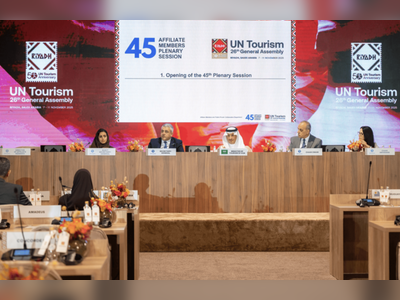
Saudi Technology Showcases 'A Paperless Event' at UN General Assembly for Tourism
Saudi technology emphasizes paperless events and sustainable practices during the UN General Assembly meetings in Riyadh.
Riyadh: In a significant step towards embracing technological advancements and promoting sustainability, Saudi Arabia is set to host the UN General Assembly meetings for the tourism sector in Riyadh.
With over 100 ministers from around the world participating, these meetings aim to chart a course for the next 50 years while focusing on the integration of artificial intelligence (AI) within the global tourism industry.
The assembly will be held amidst lush greenery cultivated in the Saudi desert, creating an environment that underscores the harmony between nature and technology.
The roundtable discussions will bring together ministers to share their visions and plans for future growth, all while ensuring the human element remains at the forefront of development efforts.
According to Sara Al-Saud, the general supervisor of International Affairs for the Saudi Ministry of Tourism, the global tourism sector currently faces a significant shortage of approximately 43 million workers.
This highlights the need for effective utilization of technology, such as AI, in addressing operational challenges and enhancing service delivery.
The discussions at the assembly will not only focus on AI but also encompass shaping the Assembly’s vision for the coming decades.
Anticipated outcomes include the signing of memorandums of understanding (MOUs) and agreements, as well as the release of recommendations aimed at fostering innovation and growth within the tourism sector.
Ahmed Al-Ghamdi, the director-general of International Research and Planning, emphasized the crucial role of human interaction in tourism.
He noted that AI plays a pivotal part in helping small and medium enterprises improve their service quality and enhance customer experiences.
Natalia Bayona, the Executive Director of UN Tourism, highlighted the sector's potential to employ youth, with 60 percent already leveraging AI technologies.
She pointed out that tourists worldwide increasingly rely on AI to explore destinations, showcasing its impact on modern tourism practices.
In preparation for these discussions, a survey was conducted among member states to assess local AI strategies and identify areas where support is needed.
This reflects the sector's recognition of AI as a vital tool for enhancing operational efficiency and catering to the demands of an evolving market.
Globally, the tourism sector contributed 10 percent to the world’s gross domestic product (GDP) in 2024, reaching $10.9 trillion—a growth rate of 8.5 percent compared to the previous year, surpassing pre-pandemic levels.
This underscores the sector's resilience and potential for future expansion.
Locally, Saudi Arabia has witnessed remarkable achievements within its tourism sector, including record numbers in visitor arrivals, spending volumes, job creation, and contributions to GDP. The direct and indirect contribution of tourism to the GDP reached 11.5 percent in 2023, with projections indicating a 16 percent growth rate by 2034 as forecasted by the International Monetary Fund.
These developments underline Saudi Arabia’s commitment to leveraging technology for sustainable development while maintaining the core principles of enhancing human experience and fostering innovation within the tourism industry.
With over 100 ministers from around the world participating, these meetings aim to chart a course for the next 50 years while focusing on the integration of artificial intelligence (AI) within the global tourism industry.
The assembly will be held amidst lush greenery cultivated in the Saudi desert, creating an environment that underscores the harmony between nature and technology.
The roundtable discussions will bring together ministers to share their visions and plans for future growth, all while ensuring the human element remains at the forefront of development efforts.
According to Sara Al-Saud, the general supervisor of International Affairs for the Saudi Ministry of Tourism, the global tourism sector currently faces a significant shortage of approximately 43 million workers.
This highlights the need for effective utilization of technology, such as AI, in addressing operational challenges and enhancing service delivery.
The discussions at the assembly will not only focus on AI but also encompass shaping the Assembly’s vision for the coming decades.
Anticipated outcomes include the signing of memorandums of understanding (MOUs) and agreements, as well as the release of recommendations aimed at fostering innovation and growth within the tourism sector.
Ahmed Al-Ghamdi, the director-general of International Research and Planning, emphasized the crucial role of human interaction in tourism.
He noted that AI plays a pivotal part in helping small and medium enterprises improve their service quality and enhance customer experiences.
Natalia Bayona, the Executive Director of UN Tourism, highlighted the sector's potential to employ youth, with 60 percent already leveraging AI technologies.
She pointed out that tourists worldwide increasingly rely on AI to explore destinations, showcasing its impact on modern tourism practices.
In preparation for these discussions, a survey was conducted among member states to assess local AI strategies and identify areas where support is needed.
This reflects the sector's recognition of AI as a vital tool for enhancing operational efficiency and catering to the demands of an evolving market.
Globally, the tourism sector contributed 10 percent to the world’s gross domestic product (GDP) in 2024, reaching $10.9 trillion—a growth rate of 8.5 percent compared to the previous year, surpassing pre-pandemic levels.
This underscores the sector's resilience and potential for future expansion.
Locally, Saudi Arabia has witnessed remarkable achievements within its tourism sector, including record numbers in visitor arrivals, spending volumes, job creation, and contributions to GDP. The direct and indirect contribution of tourism to the GDP reached 11.5 percent in 2023, with projections indicating a 16 percent growth rate by 2034 as forecasted by the International Monetary Fund.
These developments underline Saudi Arabia’s commitment to leveraging technology for sustainable development while maintaining the core principles of enhancing human experience and fostering innovation within the tourism industry.










